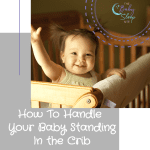
Imagine when you put your baby to sleep, your baby doesn’t cry. Your baby happily plays in his or her crib, looks at the mobile, or babbles, but isn’t sleeping. Or, your toddler happily chats in his bed for an hour every night before going to sleep. You’re lucky, right? This is the ideal baby sleep situation and you have nothing to worry about, right?
Wrong. Turns out that downtime in your baby’s crib – time in which she plays and entertains herself – might actually be detrimental to sleep. Read on for details!
Why Downtime In The Crib Can Be A Healthy and Productive Step
Occasionally, we’ll hear questions like this from our clients:
If my baby is making noise, but not crying, is it OK to leave them in the crib? For how long? Is it cruel? Will it make for a bad start to the day?
Really, we need to address this question in several parts. First, let’s address the first part of the question about whether or not you should immediately tend to your baby when he awakens, crying or not.
If your baby wakes too early in the morning (what is “too early” will be different for everyone, of course!) and she is not crying, we would absolutely recommend that you NOT go in to engage her. This will inadvertently reinforce her continuing to wake up too early. If your baby is crying, you will want to limit your engagement. (I.e. offer comfort but do not reinforce the early waking by offering loads of intervention.) Feed her, if appropriate, change her diaper, etc. But don’t make it FUN to be up! And try not to get her up UP for the day. This may “set” her internal clock to continue to wake early.
If your baby wakes up in the morning and it’s not “too early” but she’s happy, allowing some play time is perfectly okay. Nicole remembers a phase like this in her own life:
I remember one phase in my son’s sleep when I’d hear him wake up, it wasn’t too early, so I’d go in to get him up and he fussed at me for coming in too early! The first day he did this, I didn’t understand, but after a couple more times I figured out that he was enjoying his “relaxation time” in the morning. When we used to have a lot of sleep problems, I would have NEVER believed that this could happen!
Now, as to whether or not it is cruel to allow your baby to have alone time in her bed: all parents have different philosophies on this. Our take on it is if baby isn’t upset, some independent “think” time or relaxation is not a bad thing and may even be a good idea. After all, for many of us, our best ideas come when we’re lying in bed (or at least not talking to anyone), in the shower, on the treadmill – in short, during times when we are in our own world and not engaging with anyone else. Likewise, your baby may enjoy downtime and if she isn’t crying, she probably does!
When Downtime In The Crib Turns Ugly
Now that we’ve covered the “good” of downtime in the crib, let’s take a look at the “bad”. Although independent play time can be good, at some point, allowing too much “downtime” in the crib or bed can be bad for your baby’s sleep, and you do want to avoid it. Just because you may have an easy-going baby who will lay in bed for hours without crying doesn’t mean she should. Here are two reasons we don’t advocate for an abundance of downtime in the crib:
- First of all, during the newborn and early infant stage (when baby’s skull is still forming), too much time on your baby’s back can cause Plagiocephaly and their head to be flat or misshapen. Since it is recommended for SIDS prevention to put your baby on his back to sleep, this has become more prevalent. You will want to give your baby plenty of tummy time to play during the day.
- Second (and here’s where sleep comes in) too much “resting” time can actually lead to short naps, more night-wakings, and especially long middle of the night wakings, for older babies and toddlers.
Tips For Encouraging Healthy Amounts of Crib Downtime For Your Baby
- Once past the initial sleep coaching period, limit “downtime” to a maximum of 20-30 minutes before naps and 30 minutes prior to bedtime, if possible.
- If your baby or toddler has not fallen asleep within 20-30 minutes of going down for a nap, consider getting them up and trying again about 30 minutes later. OR, if it’s at night, reconsider his schedule and consider pushing bedtime back.
- Don’t make schedule decisions based on one day or even two. If your baby has a lot of “downtime” for one day, that is okay. Life happens! This article discusses more of a consistent pattern over days/weeks/months, not a one-time event.
In the end, you know your baby best. What’s “too much” for one baby won’t be for another. We had a client once whose toddler took 45 minutes to fall asleep at bedtime, no matter what time mom and dad put her down. She (the toddler) would “chat” to herself about her day and seemed to need that “unwind” time. For her, this was perfectly acceptable and even what she needed. Once our client knew that, she could build that downtime into her schedule. As always, keep in mind that something isn’t a problem until it becomes one.








